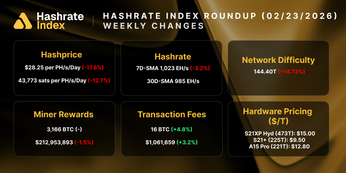
What Is Off-Grid Bitcoin Mining?
What is off-grid mining, what kind of energy does it provide to bitcoin miners, and why would miners want to utilize off-grid energy?
Off-grid mining takes place on sites that are not connected to the energy grid that provides power to the majority of people and businesses get their power.
The name is self-explanatory, but the practice (or why some miners may prefer it) may be one of the lesser-explored areas in an already largely misunderstood industry.
So what is off-grid mining, what kind of energy does it provide to bitcoin miners, and why would miners want to utilize off-grid energy?
Off-Grid Energy
Generally speaking, off-grid power (or “behind the meter” power, as it is sometimes called) is electricity that is produced from sources that are not managed by the grid (the power authorities that provide power to the bulk of residential and commercial consumers).
Off grid power typically comes from:
- Solar panels
- Wind turbines
- Hydroelectric turbines
- Natural gas / biogas
Off Grid Bitcoin Mining With Natural Gas
Bitcoin miners may utilize some of the above power sources in order to consume electricity without going to the grid directly.
The most common form of off-grid mining is via natural gas. Companies like Upstream Data, Great American Mining, JAI Energy, and Crusoe Energy Systems, for example, host mining machines on oil drilling sites in the United States and Canada. These setups use natural gas, a byproduct of oil drilling, to power their ASICs. This gas is typically burned (“flared,” in oil and gas speak) because there’s no cost effective method to transport or consume it.
Bitcoin mining, though, provides these oil and gas producers a way to monetize this otherwise stranded energy.
And bitcoin miners themselves want this stranded energy for the sole reason that it is cheap compared to the alternatives. Since natural gas is a byproduct of drilling (and since producers rarely have ways to monetize it), it’s insanely cheap compared to what they can draw from the grid.
That doesn’t mean this method is without its downsides, though. Typically, these operations have less uptime than their industrial counterparts (just under or around 80%). That’s because the gas isn’t always flowing at a constant rate and, when a well runs dry, a new one needs to be drilled before new gas can come to the surface. (That said, if the power is being purchased well below industrial rates, then these operations can still be more profitable than purchasing discounted energy from the grid).
Natural gas mining is still a largely untapped opportunity in the United States and other gas rich countries. Cambridge University’s recent Bitcoin mining report, for example, estimates that over 160 TWH of natural gas is flared every year in the United States alone, enough to power the Bitcoin network for a year (and then some).
As more oil and gas producers come to understand bitcoin and that it will give them a way to monetize their otherwise stranded gas, we anticipate that off-grid mining with natural gas will continue to eat up hashrate marketshare in the years to come.
Off Grid Bitcoin Mining With Solar Energy
Solar-powered bitcoin mining is another off-grid solution, though it has not gained nearly as much traction as mining bitcoin with stranded gas. Pound-for-pound, solar energy provides less electricity per input than natural gas and is more variable (the sun only shines for so many hours each day, and some days less than others). Still, bitcoin mining can provide a way for solar farms to monetize their operations without relying on the heavy subsidies they do in jurisdictions like the United States, as Blake King explained on a Compass podcast.
Diving into the economics of solar mining, Daniel Frumkin recently wrote about the topic for Braiins’ blog, more or less concluding that running a mining operation on solar would not make sense if the operators were relying on solar for their primary source of energy. If a solar producer wanted to use excess energy to power a deployment of rigs, though, this could be profitable--but only if Bitcoin’s price continues to appreciate and the solar operator held onto their mined stash.
"Finding out you can put load directly at your node and have a buyer, is really a silver bullet...I know there are multiple renewable companies in talks with miners on potentially co-locating or doing different offtake schemes, but these are early stage," Blake King told Luxor Technologies.
Off-Grid Mining With Hydro Power
Most hydroelectric energy around the world is connected to the grid (like the dams in China's Szechuan region which, until recently, powered the bulk of China's mining industry during the rainy season).
Still, some hydroelectric dams have been decommissioned for lack of reliable consumers or a means to dispatch the energy they create. While rare, these coveted power sources can provide cheap, abundant energy to industrial-scale bitcoin miners.
Why Would Miners Want to Mine Off-Grid?
The answer to this question is two-fold and fairly simple: cost and sovereignty.
Miners who are connected to a gas well, for example, are typically burning natural gas that would otherwise be wasted via flaring; in other words, their energy cost is virtually nothing, giving them wider profit margins compared to on-grid miners if the site is run properly.
As we’ve seen with recent regulatory pressures in China, Canada and Kazakhstan, off-grid mining also offers miners a degree of separation from governments, who may even own and operate the energy infrastructure in certain jurisdictions.
On-grid miners draw from the same power sources as businesses and residents in a given area. Like others connected to the grid, miners are subject to peak hour pricing and consumption curtailment, and in some places, they risk being the first consumers cut from the power cord as scrutiny over Bitcoin’s energy appetite increases.
If a government were to clampdown on mining, grid-drawing participants would be the easiest to target and neutralize first, while off-grid miners would be more difficult to sniff out (and in some cases, may be protected given their energy source is stranded).
Hashrate Index Newsletter
Join the newsletter to receive the latest updates in your inbox.







